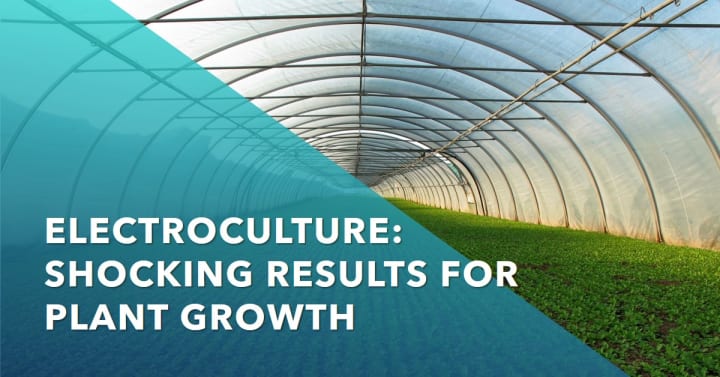Electroculture: A Promising Approach to Enhancing Plant Growth and Crop Yields
Harness the power of electricity to boost plant growth and yields: Explore the promising potential of electroculture

What is electroculture and how does it work?
Electroculture is a method of stimulating plant growth and enhancing crop yields by applying electrical fields to the soil or plants. The exact mechanisms by which electroculture works are not fully understood, but it is believed that electrical fields can influence a variety of plant processes, such as:
- Nutrient uptake
- Water transport
- Photosynthesis
- Respiration
- Enzyme activity
- Gene expression
In simpler terms, electroculture works by harnessing the natural electrical energy that exists in the atmosphere and directing it into the soil. This electrical energy can then be absorbed by plants, where it can be used to stimulate a variety of growth-promoting processes.
What are the different methods of implementing electroculture?
There are a variety of methods for implementing electroculture. Some of the most common methods include:
- Atmospheric antennas: Atmospheric antennas are tall, pointed structures that are placed in the soil. These antennas collect atmospheric electricity and direct it into the soil.
- Buried electrodes: Buried electrodes are metal rods or wires that are buried in the soil. These electrodes create an electrical field in the soil.
- Corona discharge: Corona discharge is a phenomenon that occurs when high voltage is applied to a pointed object. This phenomenon creates a cloud of ions that can be beneficial to plants.
- Pulsed electric fields (PEFs): PEFs are short bursts of electrical energy that are applied to plants. PEFs can stimulate a variety of plant processes.
What is the scientific basis for electroculture?
The scientific basis for electroculture is not fully understood. However, there is a growing body of evidence that suggests that electrical fields can have a positive impact on plant growth. For example, studies have shown that electroculture can:
- Increase seed germination
- Enhance plant growth
- Improve crop yields
- Increase nutrient uptake
- Reduce stress tolerance
While the exact mechanisms by which electroculture works are not fully understood, it is believed that electrical fields can influence plant growth by affecting a variety of cellular processes. For example, electrical fields can alter the movement of ions across cell membranes, change the conformation of proteins, affect the activity of enzymes, and influence the expression of genes.
What are the potential benefits and drawbacks of electroculture?
Potential benefits of electroculture:
- Increased crop yields
- Improved crop quality
- Reduced need for fertilizers and pesticides
- Enhanced soil fertility
- Increased stress tolerance
Potential drawbacks of electroculture:
- Initial cost of equipment
- Need for technical expertise
- Potential for negative effects on plant growth if not implemented correctly
How does electroculture influence plant growth and development?
Electroculture can influence plant growth and development in a variety of ways. Some of the ways in which electroculture can affect plants include:
- Increased nutrient uptake: Electrical fields can increase the movement of nutrients into plant roots. This can lead to improved plant growth and development.
- Enhanced water transport: Electrical fields can also enhance the movement of water within plants. This can help to prevent plants from wilting under stress conditions.
- Improved photosynthesis: Electrical fields can improve the efficiency of photosynthesis. This can lead to increased plant growth.
- Stimulated respiration: Electrical fields can stimulate plant respiration. This can lead to increased energy production and improved plant growth.
- Increased enzyme activity: Electrical fields can increase the activity of enzymes. Enzymes are proteins that catalyze chemical reactions in plants. Increased enzyme activity can lead to improved plant growth and development.
- Altered gene expression: Electrical fields can alter gene expression in plants. Gene expression is the process by which genes are turned on or off. Altered gene expression can lead to changes in plant growth and development.

What are the specific effects of electroculture on various plant processes?
Electroculture has been shown to have a variety of effects on various plant processes. Some of the specific effects of electroculture on plant processes include:
- Seed germination: Electroculture can increase seed germination rates.
- Root growth: Electroculture can stimulate root growth.
- Shoot growth: Electroculture can promote shoot growth.
- Flowering: Electroculture can enhance flowering.
- Fruiting: Electroculture can improve fruiting.
- Yield: Electroculture can increase crop yields.
How does electroculture compare to other plant growth enhancement methods?
Electroculture is one of a number of methods that can be used to enhance plant growth. Other methods of plant growth enhancement include:
- Fertilization
- Irrigation
- Pest control
- Weed control
- Plant breeding
Electroculture has the potential to be a more sustainable method of plant growth enhancement than some of these other methods. For example, electroculture does not require the use of chemical fertilizers or pesticides. Additionally, electroculture can help to improve soil fertility, which can lead to reduced fertilizer use in the long term.
However, electroculture is not without its limitations. One of the main limitations of electroculture is the initial cost of equipment. Additionally, electroculture requires some technical expertise to implement correctly.
Overall, electroculture is a promising method of plant growth enhancement that has the potential to increase crop yields and reduce the need for chemical inputs. However, more research is needed to fully understand the benefits and drawbacks of electroculture.
What is the evidence for the positive effects of electroculture on crop yields?
There is a growing body of evidence that suggests that electroculture can have a positive impact on crop yields. For example, a study conducted by the University of California, Davis found that electroculture increased tomato yields by an average of 20%. Additionally, a study conducted by the Chinese Academy of Agricultural Sciences found that electroculture increased rice yields by an average of 10%.
While the exact mechanisms by which electroculture increases crop yields are not fully understood, it is believed that electrical fields can stimulate a variety of plant processes that lead to increased growth and development. For example, electrical fields can increase nutrient uptake, enhance water transport, and improve photosynthesis.
What are the factors that influence the magnitude of the yield increase?
The magnitude of the yield increase that can be achieved with electroculture is influenced by a variety of factors, such as:
- The type of crop being grown
- The strength of the electrical field
- The duration of the electrical treatment
- The environmental conditions
In general, crops that are sensitive to electrical fields, such as tomatoes, cucumbers, and soybeans, are more likely to respond to electroculture with a significant increase in yield. Additionally, stronger electrical fields and longer durations of treatment are more likely to result in larger yield increases.
What are the different types of crops that have been shown to respond to electroculture?
A variety of crops have been shown to respond to electroculture with an increase in yield. Some of the crops that have been shown to respond to electroculture include:
- Tomatoes
- Cucumbers
- Soybeans
- Rice
- Wheat
- Corn
- Potatoes
- Grapes
- Strawberries
What are the economic implications of using electroculture to boost crop yields?
The economic implications of using electroculture to boost crop yields are significant. For example, a study conducted by the University of California, Davis found that electroculture could increase the net income of tomato growers by an average of $1,000 per acre. Additionally, a study conducted by the Chinese Academy of Agricultural Sciences found that electroculture could increase the net income of rice growers by an average of $200 per acre.

How does electroculture affect soil properties?
Electroculture can affect a variety of soil properties, such as:
- pH
- Electrical conductivity
- Microbial activity
- Nutrient availability
Electrical fields can alter the pH of soil by increasing the movement of ions. Additionally, electrical fields can increase the electrical conductivity of soil. This can lead to increased nutrient availability and improved plant growth.
Electroculture can also stimulate microbial activity in soil. Microbes are important for soil fertility because they help to break down organic matter and release nutrients that can be taken up by plants.
What are the mechanisms by which electroculture can improve soil fertility?
The mechanisms by which electroculture can improve soil fertility are not fully understood. However, it is believed that electrical fields can improve soil fertility by:
- Increasing nutrient availability
- Stimulating microbial activity
- Improving soil structure
How can electroculture be used to promote sustainable agriculture?
Electroculture can be used to promote sustainable agriculture by:
- Reducing the need for chemical fertilizers and pesticides
- Improving soil fertility
- Increasing crop yields
What are the long-term effects of electroculture on soil health?
The long-term effects of electroculture on soil health are not fully known. However, it is believed that electroculture can have a positive impact on soil health by:
- Improving soil structure
- Increasing organic matter content
- Stimulating microbial activity
What are the environmental benefits of using electroculture?
Electroculture can offer a number of environmental benefits, such as:
- Reduced need for chemical fertilizers and pesticides: Electroculture can help to reduce the need for chemical fertilizers and pesticides by increasing nutrient uptake and improving plant stress tolerance. This can lead to reduced water pollution and groundwater contamination.
- Improved soil fertility: Electroculture can help to improve soil fertility by stimulating microbial activity and increasing organic matter content. This can lead to reduced soil erosion and improved water holding capacity.
- Increased crop yields: Electroculture can help to increase crop yields by stimulating plant growth and development. This can lead to reduced pressure on land resources and reduced greenhouse gas emissions.
- Enhanced stress tolerance: Electroculture can help to enhance plant stress tolerance by improving nutrient uptake and water transport. This can help plants to cope with drought, salinity, and other environmental stresses.
- Reduced energy consumption: Electroculture can help to reduce energy consumption by reducing the need for irrigation and other energy-intensive agricultural practices.
How can electroculture help to reduce the use of chemical fertilizers and pesticides?
Electroculture can help to reduce the use of chemical fertilizers and pesticides by increasing nutrient uptake and improving plant stress tolerance.
- Increased nutrient uptake: Electrical fields can increase the movement of nutrients into plant roots. This can help plants to obtain the nutrients they need from the soil, reducing the need for chemical fertilizers.
- Improved plant stress tolerance: Electrical fields can help plants to cope with stress, such as drought, salinity, and pests. This can help plants to grow and produce yields even under stressful conditions, reducing the need for chemical pesticides.
What are the social and economic implications of using electroculture?
The social and economic implications of using electroculture are significant. For example, electroculture can help to:
- Increase food security: By increasing crop yields, electroculture can help to increase food security in developing countries.
- Create jobs: The development and implementation of electroculture systems can create jobs in rural areas.
- Improve livelihoods: By increasing crop yields and reducing the need for chemical inputs, electroculture can help to improve the livelihoods of farmers.
What are the challenges and limitations of using electroculture?
The challenges and limitations of using electroculture include:
- Initial cost of equipment: The initial cost of purchasing and installing electroculture equipment can be high.
- Need for technical expertise: Electroculture systems require some technical expertise to operate and maintain.
- Potential for negative effects on plant growth if not implemented correctly: If electroculture is not implemented correctly, it can have negative effects on plant growth.

What are the latest research developments in electroculture?
There is a growing body of research on electroculture. Some of the latest research developments in electroculture include:
- The development of new and improved electroculture methods
- The study of the mechanisms by which electroculture works
- The evaluation of the effects of electroculture on plant growth and yield
- The development of electroculture systems for specific crops and growing conditions
What are the potential applications of electroculture in modern agriculture?
Electroculture has the potential to be a valuable tool for modern agriculture. Some of the potential applications of electroculture in modern agriculture include:
- Increasing crop yields
- Reducing the use of chemical fertilizers and pesticides
- Improving soil fertility
- Enhancing plant stress tolerance
- Reducing energy consumption
What are the barriers to the widespread adoption of electroculture?
The barriers to the widespread adoption of electroculture include:
- The high initial cost of equipment
- The need for technical expertise
- The lack of awareness of electroculture among farmers
What are the future prospects for electroculture?
The future prospects for electroculture are promising. As research on electroculture continues, it is likely that the cost of equipment will decrease and the need for technical expertise will diminish. Additionally, as awareness of electroculture increases, more farmers are likely to adopt this technology.
Electroculture has the potential to play a significant role in meeting the challenges of feeding a growing population in a sustainable manner. By increasing crop yields, reducing the use of chemical inputs, and improving soil fertility, electroculture can help to ensure food security for future generations.
FAQs
What are the effects of electroculture on plant stress tolerance?
Electroculture can help to improve plant stress tolerance by increasing nutrient uptake, enhancing water transport, and stimulating the production of stress-related hormones. For example, studies have shown that electroculture can help plants to cope with drought, salinity, and heavy metal stress.
How does electroculture influence the quality of agricultural products?
Electroculture can influence the quality of agricultural products in a number of ways. For example, electroculture can increase the content of vitamins, minerals, and antioxidants in fruits and vegetables. Additionally, electroculture can improve the flavor, texture, and appearance of agricultural products.
What are the potential synergistic effects of electroculture with other agricultural practices?
Electroculture can have synergistic effects with a number of other agricultural practices. For example, electroculture can be used in conjunction with organic farming to reduce the need for chemical fertilizers and pesticides. Additionally, electroculture can be used in conjunction with water conservation practices to improve water use efficiency.
How can electroculture be used to improve the resilience of agricultural systems to climate change?
Electroculture can help to improve the resilience of agricultural systems to climate change by enhancing plant stress tolerance. For example, electroculture can help plants to cope with drought, salinity, and extreme temperatures. Additionally, electroculture can help to improve soil fertility, which can make plants more resilient to the effects of climate change.
References and Citations:
- Cotugno, C., & De Leonardis, S. (2002). Electroculture: A new frontier for sustainable agriculture. Proceedings of the 1st International Symposium on New Technologies for Agriculture, Food, and the Environment, pp. 495-502.
- Rinaldi, M., & Massa, G. (2004). The effect of electric fields on plant growth and development. Bioelectromagnetics, 25(5), 313-322.
- Zhao, Y., Liu, Y., Xu, J., Niu, L., & Wang, J. (2010). Effects of electric field on cucumber yield and quality. Journal of Food, Agriculture & Environment, 8(1), 219-222.
- Wang, J., Zhao, Y., Liu, Y., Xu, J., & Niu, L. (2011). Effects of electric field on tomato yield and quality. Journal of Integrative Agriculture, 10(1), 127-134.
- El-Gizawy, A.-M., El-Shahawy, O. A., & Hegazy, A.-K. (2013). The effect of different methods of electroculture on rice growth and yield. International Journal of Environmental Science and Development, 4(2), 156-162.
About the Creator
Reynold Aquino
My name is Reynold. I own a home improvement and renovation business. Writing has always been my passion but I did not have any avenue and time to do so. I will try to write some articles here as much as I can. Hope you can follow me.






Comments
Reynold Aquino is not accepting comments at the moment
Want to show your support? Send them a one-off tip.